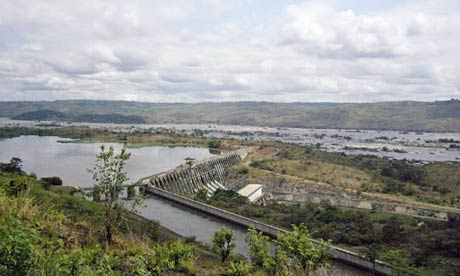Will Huge New Hydro Projects Bring Power to Africa’s People ?
Posted by Big Gav in africa, hydro power
Yale Environment 360 has an interesting look at hydro power plans for Africa - Will Huge New Hydro Projects Bring Power to Africa’s People?.
Sub-Saharan Africa, where more than three-quarters of the population is without electricity, will soon be lit up — or that’s the promise of governments building a host of new hydroelectric schemes across the continent. These projects are an attempt to keep up with the rising power demand from Africa’s economic boom. But the trouble is that, like the boom, the power seems destined to benefit only small industrial and urban elites. For the rest of Africa’s billion inhabitants, this investment looks unlikely to further UN secretary general Ban Ki-moon’s goal of “sustainable energy for all.”The Congo River in central Africa — the world’s second-largest river after the Amazon — is the latest focus of the rush to harness the continent’s rivers for generating electricity. On May 18, the government of the Democratic Republic of the Congo (DRC) announced in Paris that it was initiating the first phase of the world’s largest hydro scheme on the river’s majestic Inga Falls. At these falls, downstream from the capital Kinshasa, the massive Congo’s entire flow of 42,000 cubic meters a second cascades down a series of rapids, falling 100 meters within a 15-kilometer stretch.
South African hydro-engineer Henry Oliver has called Inga Falls “one of the greatest single natural sources of hydroelectric power in the world,” and his fellow engineers have long dreamed of tapping these waters to power an Africa-wide electricity grid. Two small schemes built in the 1970s The completed project on the Congo would be twice the size of China’s Three Gorges dam. and 1980s, known as Inga I and Inga II, are largely moribund, victims of the DRC’s wrecked economy and long-running civil war.
But the idea was revived a decade ago, when world leaders pledged a New Partnership for Africa’s Development (NEPAD). Now it is Chinese construction companies — including Sinohydro, the world’s largest dam builder — who are in line for the contracts.
The first phase, dubbed Inga III, will on its own generate more power than Africa’s current largest hydroelectric-dam, the High Aswan on the Nile in Egypt. Construction should begin in 2015 and will cost at least $8.5 billion. The energy is mostly destined for South Africa, 3,000 kilometers away, where energy utility Eskom has promised to take more than half the capacity of 4,800 megawatts (MW).
But the project’s eventual aim, the DRC’s water and electricity minister Bruno Kapandji Kalala told the Paris meeting, is even grander. The completed project would be almost ten times larger than the initial phase, making it twice the size of China’s Three Gorges hydro-scheme, currently the world’s biggest. It will tap the Congo with 50 separate riverside electricity generating units, each the size of a large conventional power station.
The treaty signed between DRC and South Africa pledges both countries to the $50-billion development, along with extensive transmission lines to a planned southern African supergrid. The project’s promoters say it could one day supply power to half a billion people across the whole of Africa. But the logistics of constructing a distribution to more than a handful of urban centers would take many decades and dwarf the cost of building the hydroelectric works, and nobody has suggested where that money would come from.
There is, it has to be said, an environmental case for the Inga Falls scheme. The Congo River’s flow is so strong and so constant that its enormous power can be extracted without a large dam to store water. With no large reservoir, the “run-of-river” scheme will flood little land, thus saving rainforests, reducing the need to move people, and limiting greenhouse gas emissions from rotting vegetation. Unlike many dam projects in rainforests, it will be a genuinely low-carbon source of energy.
The Inga Falls project is only the latest of a rush of giant hydroelectric dams across Africa. They include the recent completion of the 250-MW Ethiopia’s Grand Renaissance Dam on the Blue Nile will shortly supplant the High Aswan as Africa’s biggest. Bujagali dam on the Nile in Uganda, which has flooded a much-loved local falls; a 300-MW Chinese dam completed in 2009 in Tekeze canyon at the headwaters of the Nile in Ethiopia, which at 185 meters is one of Africa’s highest; and the 120-MW Djibloho dam completed last year on the Wele River, which now supplies 90 percent of the electricity in tiny Equatorial Guinea.
But these are small fry. This week, Ethiopia diverted the flow of the Blue Nile while it constructs the 6,000-MW Grand Renaissance dam on the river near the border with Sudan, which will shortly supplant the High Aswan as Africa’s biggest. And Ethiopia is just completing the 1,800-MW Gibe III dam on the River Omo. The latter was a favorite of the former prime minister, Meles Zenawi, who defended the project against Western criticism in 2011 by saying: “We want our people to have a modern life and won’t allow [them] to be a case study of ancient living for scientists and researchers.”






